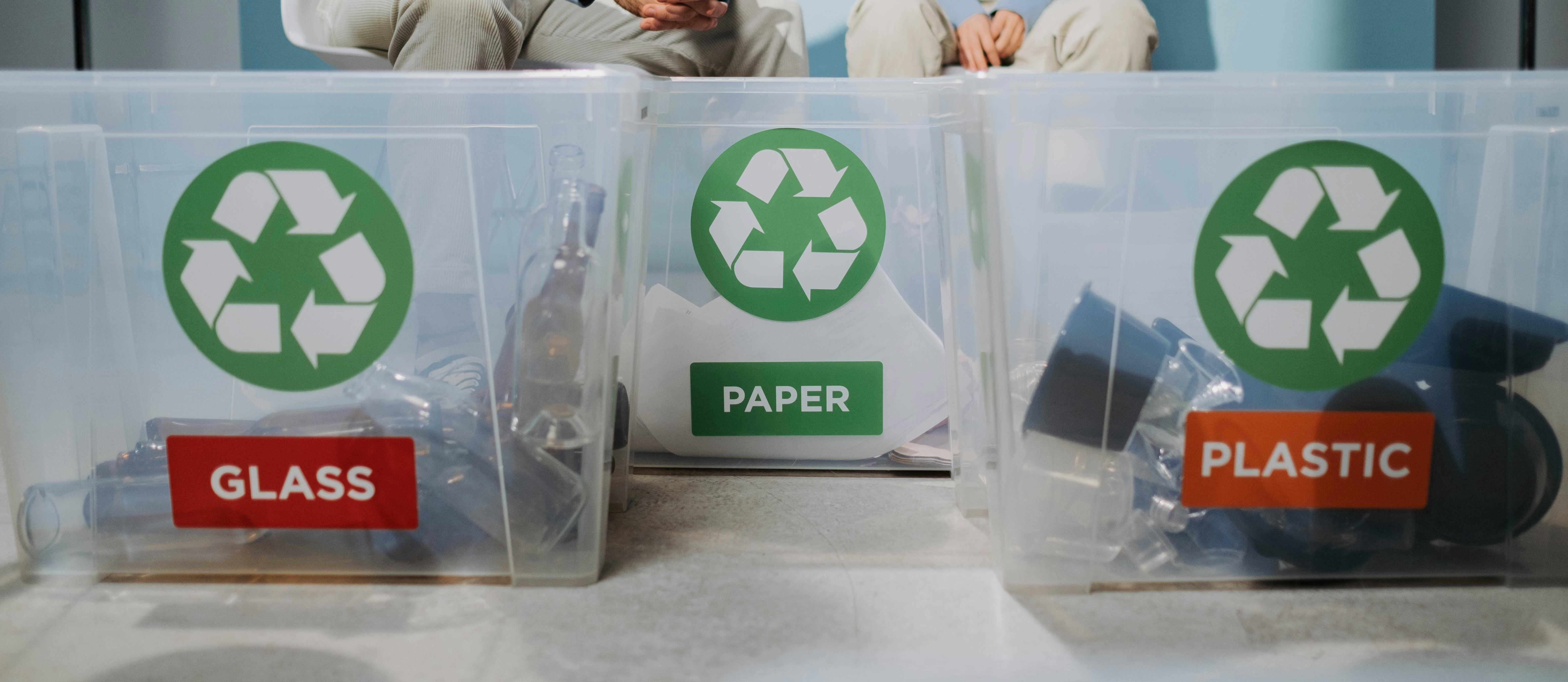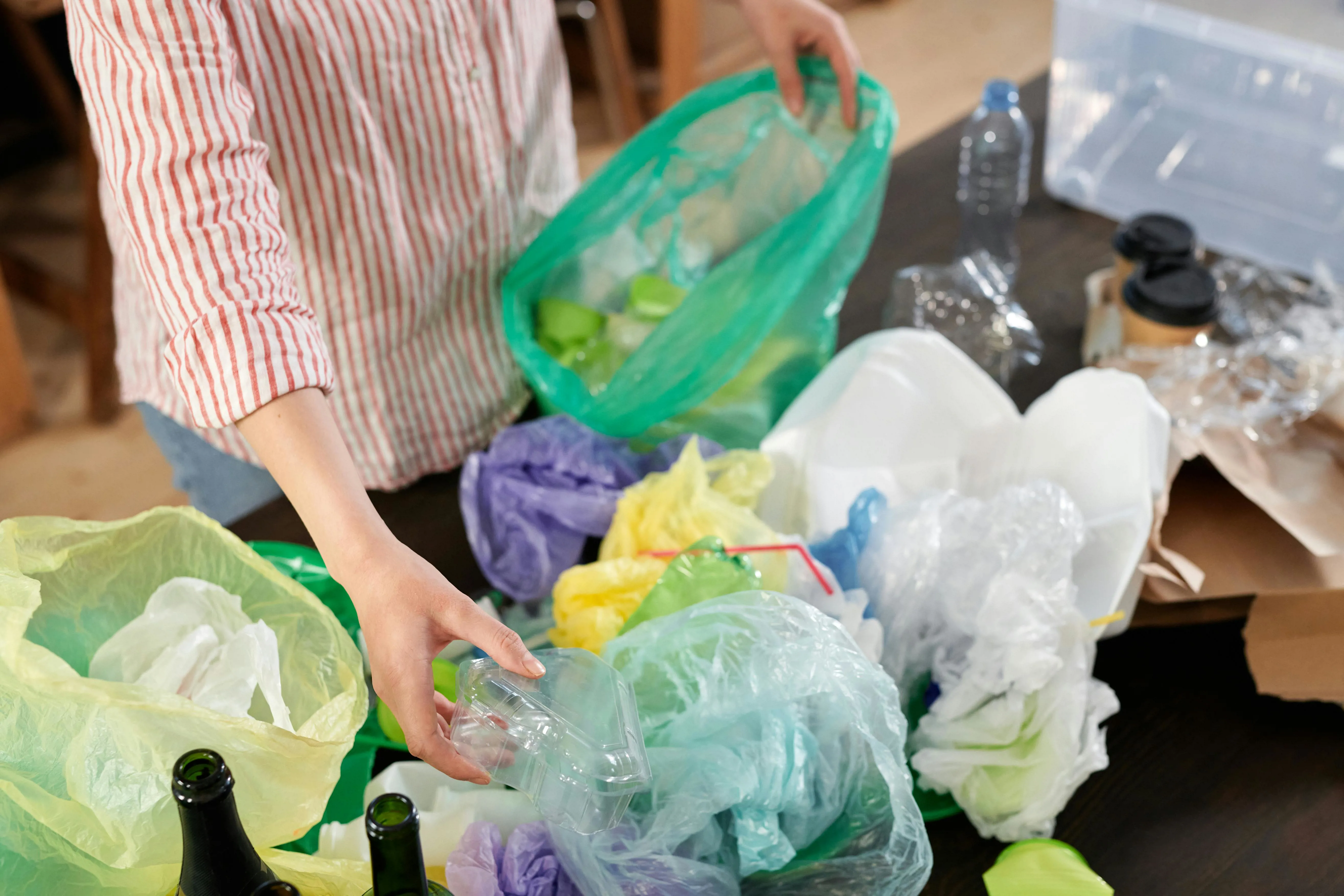New recycling rules are now in effect, and every business in England must separate recyclable materials and food waste from general rubbish.
These mandatory waste separation rules are part of the government’s Simpler Recycling plan, designed to make recycling easier and more consistent across the UK.
Similar workplace recycling regulations are already active in Wales, Scotland and Northern Ireland, so the move brings England in line with the rest of the UK.
If your workplace isn’t fully set up yet, don’t worry. Getting there is simple with the right bins and support. We’ll break down what the business recycling law 2025 means for your business and how to meet the new rules quickly and easily.
What are the new waste separation rules for businesses?
Every business in England must follow new mandatory waste separation rules — separating recyclables and food waste from general rubbish.
These changes are part of the government’s Simpler Recycling plan, which aims to make recycling easier and more consistent across homes and workplaces in the UK.
Under the new workplace recycling regulations, all businesses must separate key materials before collection:
- Paper and card – for example, packaging, envelopes and office paper
- Plastic, glass and metals – such as bottles, cans and food containers
- Food waste – if your business produces it regularly. These food waste recycling rules help ensure that leftover food is collected separately and turned into energy or compost rather than going to landfill.
The rules apply to:
- All businesses, charities and public organisations in England
- Every workplace size, although micro-businesses with fewer than ten employees have until 31 March 2027 to meet the requirements
- Shared sites, where landlords and tenants should agree on responsibilities for recycling and waste collection
Local councils and the Environment Agency oversee compliance to ensure each business meets its business waste obligations.
If your workplace still hasn’t updated its bins, now’s the time. Each waste type must have its own clearly labelled container to keep materials clean and recyclable.

Why these rules matter (and what’s changing)
The new mandatory waste separation rules are about more than just compliance. They’re part of a national effort to make recycling simpler, clearer and more effective for every business in the UK.
The aim is straightforward:
- Consistency – so that recycling systems are the same wherever you work or live
- Less waste to landfill – by collecting clean, separated materials that can be recycled
- Better sustainability – helping businesses lower their carbon footprint and show real progress on environmental goals
The Simpler Recycling plan for businesses also means you no longer need to guess what goes where. With clear categories for paper, plastics, metals, glass and food waste, recycling is now easier for staff to understand and follow every day.
These changes make recycling simpler, cut confusion and save resources across the country. So, who exactly needs to comply? Let’s take a closer look.
Which businesses are affected by the 2025 recycling law?
The business recycling law 2025 applies to all workplaces in England, no matter their size or sector. That includes:
- Private businesses
- Public organisations
- Charities and community groups
If your business produces waste, you must separate it into the required streams for recycling.
Key details to know
- All businesses must comply now, as the law is already in effect.
- Micro-businesses with fewer than ten employees have an extended period until 31 March 2027 to meet full compliance.
- In shared or managed buildings, landlords and tenants must agree who’s responsible for recycling arrangements and documentation.
- These rules cover every sector, from offices and cafés to retailers, schools and hospitals.
Here’s a quick overview:
|
Business type |
Compliance date |
Waste streams |
|
Office (10+ staff) |
Active from March 2025 |
Paper, plastic, metal, glass, food |
|
Café or restaurant |
Active from March 2025 |
Food and recyclables |
|
Micro-business |
By March 2027 |
Same as above |
Every workplace is now expected to use separate bins for each recyclable material to meet business waste compliance standards.
How to prepare your business for compliance
Even though these laws are in place already, it’s not too late to get your systems in order. A few simple actions will make sure your workplace meets all business waste compliance requirements and runs smoothly.
Step 1 – Audit your waste
Start by understanding what you throw away.
- Identify which materials your workplace produces most often.
- Separate recyclable and non-recyclable waste.
- Review your current collection arrangements and frequency.
- Record your findings so you can measure progress later.
Step 2 – Set up recycling stations
Make recycling easy for everyone by setting up clear stations.
- Use separate bins for each waste stream: paper, plastic, glass, metal and food.
- Place bins in kitchens, canteens, print areas and staff rooms.
- Add colour-coded labels or posters to reduce contamination.
- If you’re not sure where to start, First Mile’s bin systems make it easy to stay compliant.
Step 3 – Train and engage employees
Your recycling success depends on your team.
- Run a quick induction or poster campaign.
- Nominate a “recycling champion” to lead by example.
- Share updates about what happens to your waste after collection to build engagement.
Step 4 – Partner with a licensed waste carrier
Using a licensed waste carrier is a legal requirement.
- Always check your provider’s licence on the government register.
- Keep Waste Transfer Notes for each collection to prove compliance.
- First Mile provides digital documentation and full traceability through its online portal.
Step 5 – Monitor and review
Stay on track by reviewing your recycling regularly.
- Track recycling rates and contamination levels.
- Schedule periodic reviews or audits.
- Use First Mile’s reporting tools to simplify compliance tracking and measure impact.
A clear office recycling setup makes compliance simple and keeps recycling rates high. Taking these steps will help you stay compliant, reduce waste and make recycling part of everyday life at work.

Avoiding common compliance mistakes
Most businesses want to do the right thing but can slip up on small details. Here are the most common issues to watch out for under the new workplace recycling regulations:
- Mixing recyclables with general waste, which makes materials unusable
- Forgetting to separate food waste from dry recyclables
- Not labelling or communicating how bins should be used
- Working with an unlicensed waste collector
- Failing to keep or store Waste Transfer Notes
Avoiding these mistakes will help you meet business waste compliance standards and avoid unnecessary fines.
First Mile makes it easy with compliant bins, clear signage and digital Waste Transfer Notes that keep all your records in one place.
What happens if your business doesn’t comply?
If your workplace hasn’t yet met the mandatory waste separation rules, now’s the time to act. Local councils and the Environment Agency are responsible for checking compliance and can issue:
- Warnings or compliance notices for businesses that haven’t followed the new recycling law
- Environment Agency recycling fines if waste isn’t separated correctly
- Requests for proof of Waste Transfer Notes to show you’re using a licensed waste carrier
Beyond penalties, non-compliance can also harm your company’s reputation and sustainability goals. Failing to follow business waste compliance regulations may affect your ESG reporting and customer confidence.
The good news is that staying compliant is simple. With the right systems and support, you can avoid recycling fines, meet your legal obligations and protect your business reputation.
How First Mile can help your business stay compliant
Keeping up with the business recycling law 2025 is easier when you have the right partner. At First Mile, we provide everything your workplace needs to stay compliant with workplace recycling regulations and simplify sustainability across every waste stream.
Our recycling services
We collect all main materials, including:
- Mixed recycling (paper, cardboard, plastics, glass and metals)
- Food waste
- General waste
- WEEE and electronics recycling
Why businesses choose First Mile
- Fully licensed waste carrier with nationwide coverage
- Compliant bins, signage and colour-coded systems
- Digital Waste Transfer Notes for easy documentation
- 24/7 online portal to manage collections and track reports
- Transparent impact data through our Impact Report
Trusted by thousands of UK businesses, First Mile helps you stay ahead of the law while improving your sustainability performance.
Get ahead of the 2025 recycling law
The new business recycling rules have changed the way every organisation in England manages waste. Separating recyclables and food waste is no longer optional, it’s the law.
By acting now, you can avoid last-minute stress, meet your business waste compliance obligations and show your commitment to sustainability. A well-organised recycling setup also boosts employee engagement and helps reduce your environmental impact.
If you’re still getting systems in place, now’s the time to act. Get ahead of the 2025 recycling law. Talk to First Mile about your business waste setup today.
FAQs
When did the new waste separation rules start?
The recycling law in England 2025 began on 31 March 2025. It’s now active across England, following similar systems already in place in Wales, Scotland and Northern Ireland.
Which materials must businesses separate?
Under the mandatory waste separation rules, you must recycle:
- Paper and card
- Glass
- Plastic and metal packaging
- Food waste (if produced regularly)
Do small businesses have to comply?
Yes. All businesses must follow the workplace recycling regulations. However, micro-businesses with fewer than ten employees have until 31 March 2027 to comply fully.
What are the penalties for not following the law?
Local councils and the Environment Agency can issue warnings, fines or compliance notices for failing to separate waste or keep Waste Transfer Notes.
How can First Mile help my business?
First Mile provides commercial recycling collections, compliant bins and signage, and full digital documentation to prove business waste compliance. Our team makes it simple to stay on track and meet every requirement.


